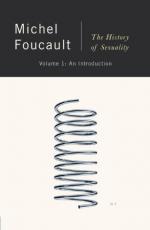
|
| Name: _________________________ | Period: ___________________ |
This test consists of 5 short answer questions, 10 short essay questions, and 1 (of 3) essay topics.
Short Answer Questions
1. Which of the following statements regarding power would Foucault likely agree with?
2. What is the feature of juridico-discursive power that Foucault labels as the negative relation of power and sexuality?
3. Why does Foucault call power "omnipresent?"
4. What are the "reasons for being" of the deployment of alliance compared to the deployment of sexuality?
5. Which of the following does NOT represent a transformation the Foucault identifies after the nineteenth century?
Short Essay Questions
1. In what form did sexuality first arise, and what was its intended purpose?
2. What does Foucault have to say about resistance? Where can you find it?
3. Explain what is meant by the statement that sexuality changed from a matter of death and sin to a matter of life and illness.
4. How did sexuality spread to the general population?
5. What role does discourse play in power?
6. Relationships between power and knowledge are transformational matrices and highly subject to change. Give an example of a power-knowledge relationship that has changed dramatically.
7. How does Foucault claim monarchs of the middle ages persuaded the existing power centers to accept and participate in their power?
8. Explain the concept of juridico-discursive power. Where does Foucault say we perceive it to act?
9. What does Foucault mean when he refers to the cyclical nature of power and law? Explain.
10. Explain the principles of negative relation and the cycle of prohibition in the juridico-discursive power structure.
Essay Topics
Write an essay for ONE of the following topics:
Essay Topic 1
Describe Foucault's reasons that support his argument that sexual repression is not a historical fact, but rather a modern creation imposed retroactively on the past.
Part 1: What does he say took place instead of repression?
Part 2: How did it come about?
Essay Topic 2
According to Foucault, the equating of power and pleasure, and of power and perversion, emerged along four principle modes. Discuss what each mode means and how it came about.
Part 1: Analysis of sexuality.
Part 2: Classification of perversions.
Part 3: Medicalizable objects.
Part 4: Fragmentation and analysis of sexuality.
Essay Topic 3
The confessional paved the way for the creation of other mechanisms and institutions to create authorized and necessary forms of sexual discourse. Write an essay describing those mechanisms and institutions and their own forms of sexual discourse.
Part 1: Judicial.
Part 2: Medical.
Part 3: Governmental.
Part 4: Pedagogical.
|
This section contains 1,072 words (approx. 4 pages at 300 words per page) |

|




